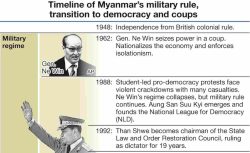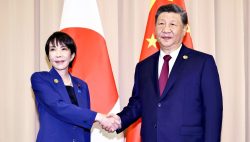U.S. presidential election: What changes will Trump’sreturn to power bring? / Fixing divisions, rebuilding order urgently needed
16:15 JST, November 7, 2024
Former Republican U.S. President Donald Trump won the U.S. presidential election, defeating Democratic Vice President Kamala Harris.
Trump, who sees all forces that oppose him as enemies and apparently embodies the divisions in U.S. society, will take over the reins of government once again. Will he be able to restore the prestige of the United States and democracy and rebuild the international order?
Extremely unusual race
This presidential election was a choice between Trump’s comeback to power and being “anti-Trump.”
Trump lost the 2020 election to Democratic President Joe Biden, but Trump did not accept the results, leading to his supporters storming and occupying the U.S. Capitol. He was indicted over four criminal incidents, including this one.
It is odd that a man who has served as president ran for the presidency for the third time while facing criminal prosecution.
In addition, Trump was shot in July and also was the target of another assassination attempt. However, he used the incidents to appear as a strong leader, who would not succumb to violence, and support for him increased.
Meanwhile, for the Democratic Party, Biden, who was seeking reelection, withdrew from the presidential race in July and Harris became the party’s candidate. Although Harris united the party under the slogan of defeating Trump, she was unable to dispel concerns about her qualifications, partly because she was chosen without going through the party primaries.
The presidential debate, which normally would be held more than once, took place only one time between Trump and Harris, and it was marked by both sides shouting abusive language. It is regrettable that the election campaign has highlighted serious divisions in society, which evoke images of a civil war.
What propelled Trump back to the presidency was the result of nothing more than the fact that voters who are frustrated with the Biden administration sought change.
The past four years have seen historically high prices persist, a phenomenon dubbed “Bidenflation.” The number of illegal immigrants surged and social unrest increased. Harris, who is at the center of the current administration, also faced harsh criticism from voters.
Mounting frustration over inflation
Traditionally, the Democratic Party has labor unions as its support base and has advocated itself as a party of the ordinary people. In recent years, however, the radical left, which seeks to realize more drastic policies on issues such as race, ethnicity and gender, has gained a greater voice, and it has been said that the party has become elitist.
Trump, on the other hand, has been a self-proclaimed outsider in the political arena while having served as president, and he has expanded his support by stirring up people’s anger and discontent. This appeal might have attracted not only white workers, but also independent voters who feel a sense of social stagnation.
Russia’s aggression against Ukraine and the conflict in the Palestinian territory of Gaza are taking place concurrently and they continue to take people’s lives. China is openly challenging the liberal democratic international order that has been led by the United States and is trying to make rules that favor its own country.
In his victory speech on Nov. 6, Trump repeated the slogan he has used since his first term: “Make America great again.” His approach of demanding that even allies and friendly nations of the United States bear their fair share of the burden and trying to make “deals” by using tariffs and other policies as weapons is expected to remain unchanged.
During his first term, Trump tried to resolve various situations through summit diplomacy by deepening friendly relations with authoritarian leaders, such as Russian President Vladimir Putin, Chinese President Xi Jinping and North Korean leader Kim Jong Un, but he could not produce results through any of these attempts. Trump is urged to respond cautiously.
Regarding Russia’s aggression against Ukraine, Trump has publicly stated that he would end it before taking office. However, if he rushes into a ceasefire and makes concessions to Putin, who has violated international law, the international order based on the rule of law and the respect for sovereignty will be fundamentally shaken.
Trump is known for his excessively pro-Israel stance, including designating Jerusalem as the capital of Israel during his presidency. Like the Biden administration, Trump is highly likely to continue providing arms assistance to Israel.
Trump can only be described as being great if he takes the lead in global peace and stability, not just the interests of the United States. It is hoped that Trump will fulfill his promise to restore greatness in that sense.
Japan’s diplomacy to be tested
The security environment around Japan has been deteriorating. For example, China and Russia have repeatedly engaged in military provocations, and North Korea dispatched its troops to Russia. Under such circumstances, the Japan-U.S. alliance is becoming even more important.
Although the Biden administration’s stance has been to emphasize the importance of alliances and international cooperation, it is expected that the United States will now make demands of Japan, such as a large increase in Japan’s share of the cost of stationing U.S. forces in Japan.
Japan cannot rely on personal relationships, such as the one that former Prime Minister Shinzo Abe had built with Trump. Japan must work to maintain and strengthen its alliance with the United States, while asserting what it needs to assert. Japan’s diplomatic ability will be tested.
(From The Yomiuri Shimbun, Nov. 7, 2024)
Top Articles in Editorial & Columns
-

Myanmar Will Continue Under Military Rule Even After Election, Ex-Ambassador Maruyama Says in Exclusive Interview
-

40 Million Foreign Visitors to Japan: Urgent Measures Should Be Implemented to Tackle Overtourism
-

Expansion of New NISA: Devise Ways to Build up Household Assets
-

China Criticizes Sanae Takaichi, but China Itself Is to Blame for Worsening Relations with Japan
-

Withdrawal from International Organizations: U.S. Makes High-handed Move that Undermines Multilateral Cooperation
JN ACCESS RANKING
-

Univ. in Japan, Tokyo-Based Startup to Develop Satellite for Disaster Prevention Measures, Bears
-

JAL, ANA Cancel Flights During 3-day Holiday Weekend due to Blizzard
-

China Confirmed to Be Operating Drilling Vessel Near Japan-China Median Line
-

China Eyes Rare Earth Foothold in Malaysia to Maintain Dominance, Counter Japan, U.S.
-

Japan Institute to Use Domestic Commercial Optical Lattice Clock to Set Japan Standard Time




















